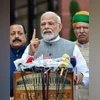Despite heavy odds and global crises, India showed remarkable resilience to keep inflation under control, Prime Minister Narendra Modi has said, exuding confidence that the BJP was a "natural choice” for the people and will form a majority government for a third time in a row in 2024.
In an interview with newsmagazine India Today, released on Friday, Modi said the country was on the road to fulfilling the target of becoming a $ 5 trillion economy and a developed country by 2047. Noting that his government is investing in skill development, he said the New Education Policy will help small and medium enterprises grow into larger enterprises and restructure financial markets.
Hitting out at the Opposition, he said the country was aware of the pitfalls of the coalition governments.
"We have lost 30 years due to instability resulting from mili-juli sarkars. People have seen the lack of governance, the appeasement politics, and corruption in the era of mili-juli sarkars (coalition governments," Modi said. Asserting that the coalition governments resulted in a “loss of optimism and confidence” among people and gave a “bad image” to India in the world, he said the BJP was a "natural choice" in 2024.
To the Opposition's charges of lack of jobs and rising inflation, Modi said: "Despite heavy odds, global crises, supply chain breakdowns and geopolitical tensions impacting global prices of basic items, average inflation from 2014-15 to 2023-24 (till November) was only 5.1 per cent, compared to 8.2 per cent during the previous ten years (2004-'14). Which is higher, inflation of 5.1 per cent or 8.2 per cent?"
On job creation, Modi said his government has constantly increased capital investment outlays. In the Budget for 2023-24, it increased steeply to Rs 10 lakh crore, up from Rs 1.9 lakh crore in 2013-14, which would create so many opportunities for the common man, he said, adding that infrastructure creation is happening at a "never-seen-before pace, and all sectors are doing much better than how they were ten years ago".
In a reference to the recent debate that the BJP lacked a nationwide electoral footprint, Modi said his party was the "single largest party in southern India in terms of Lok Sabha seats", had a government in Karnataka until May and has a government in Puducherry.
"We currently govern in 16 states and are the principal opposition in eight," he said, adding that election after election, the BJP has dispelled labels that it is a "Brahmin-Bania party" and the "party exclusively for the Hindi heartland".
"From no presence in 2014, we are now in government in six Northeast states, including Christian-majority states like Nagaland and Meghalaya," he said.
Touching upon his decision-making process, Modi said, "When I start something, I know the endpoint. But I never announce the final destination or blueprint in the beginning. So, what you see today is not what I've worked on. A far bigger picture will unfold finally. I work on a big canvas. Like an artist, I start from one point, but at the time the final picture can't be seen."
He cited examples such as the Statue of Unity in Gujarat and the national capital's Bharat Mandapam. "This is my working style. When work on the Bharat Mandapam started, no one thought the G20 would happen here. But I was working with a plan. If I work towards the new Parliament building or 40 million houses for the poor, I do it with equal planning and dedication," he said.
Modi said he formulated policies after listening to economists and subject experts and applied his knowledge gained through the "ground connect" and "lived reality" of the country.
"Growing up in poverty and having had the good fortune of being connected to people at the grassroots gave me an insight into how reforms should focus on improving the lives of the people, and not on mere headlines. We believe in achieving national goals through Jan Andolans (people's movements)," he said.
On picking new faces as chief ministers, the prime minister said it was not a new trend. "I am the best example of this practice within the BJP. When I became the chief minister of Gujarat, I had no prior administrative experience and was not even elected to the legislative assembly," he said, adding the BJP had the ability to nurture multiple generations of leadership at the same time, while Parivarvadi (dynasty-based) parties find this democratic churn difficult.













)
